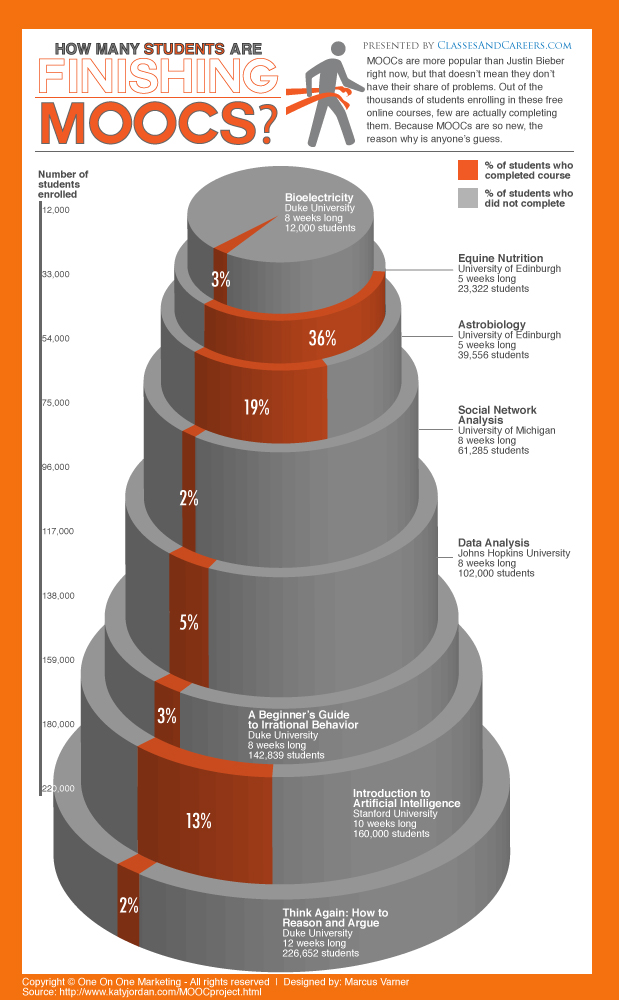MOOCs Started, Not Finished, in Massive Numbers; Rapid Growth Raises Questions
/
A massive open online course (MOOC) is an online course aimed at unlimited participation and open access via the web. Even as MOOCs continue to accelerate in popularity - enrollment in all online courses is reportedly up 29 percent since 2010 - and variety of offerings institutions and courses, there are some speed bumps worth considering – led by the very high percentage of courses that are started but not completed. The reasons why are unclear.
An infographic illustrates the current reality, and suggests that the lack of enthusiasm in some higher education circles for offering MOOCs may have justification – even if data in the relatively new field remains short of robust. Courtesy of the blog Classes and Careers (Marcus Varner) and education blogger Katy Jordan, the completion percentage of extremely popular courses becomes evident – as low as two percent in so me cases. Given the often massive numbers of enrollees, the small percentage may belie the raw numbers – and the benefits to those students, as well as to those who may have decided not to see a course through to the end.
me cases. Given the often massive numbers of enrollees, the small percentage may belie the raw numbers – and the benefits to those students, as well as to those who may have decided not to see a course through to the end.
The recently issued 2013 Campus Computing Survey by The Campus Computing Project, the largest continuing study of the role of computing, eLearning, and information technology in American higher education, found that CIOs and senior campus IT officers “are not overly optimistic about MOOCs as a viable strategy for instruction or for revenue.” The survey indicated that just over half (53 percent) agree that MOOCs “offer an effective academic model for the effective delivery of online education” while less than a third (29 percent) view MOOCs as offering “a viable business model” for campuses to secure new revenue from online courses.
In Connecticut, Wesleyan University led the way into the MOOC world, announcing last September its partnership with Coursera, one of the leading companies in the field. Wesleyan was Coursera's first small liberal arts college and offered six courses, The Hartford Courant reported earlier this year. Among those teaching a MOOC course was Wesleyan President Michael Roth, who told the Courant that the class "has been a wonderful surprise. I have been so impressed by the level of discourse among the students and by their excellent questions back to me … I will offer the class again for Coursera, and my teaching at Wesleyan in the future will be informed by my online experience."
According to Wall Street Journal reporting by the publication’s deputy technology editor, “Early studies highlight a number of problems with the learning experience in online courses that educators are scrambling to solve. Perhaps most important: Staring at a screen makes some students feel isolated and disengaged, which can lead to poor performance or dropping out altogether. Often, more than 90% of people who sign up for a MOOC don't finish, though many come to online learning with a different intent than would students at a traditional university.”
Writing last year in UConn Today, a publication of the university, Jeremy Teitelbaum, dean of the College of Liberal Arts and Sciences, said of the wave of institutions adding MOOCs: “I tend to be skeptical of predictions of doom for universities, and I’m especially skeptical of claims that online education will put an end to the classroom experience. After all, the university as an institution has successfully evolved through the inventions of the printing press, the steam engine, the telegraph, radio, television, and the atomic bomb; given that record, it is likely to survive the Internet as well.”
The largest provider, Coursera, has five million participants, and nonprofit provider edX more than 1.3 million, according to the Wall Street Journal. While the majority are based in the U.S., their learners come from all over the globe: among edX's students, 9% came from Africa and 12% from India, the Journal reported.
The Courant reported that Yale has long had a presence online, most notably with its Open Yale Courses program, which began in 2006 and made free noncredit courses available worldwide. In mid-May Yale announced that it would partner with Coursera to begin offering classes during the upcoming academic year. Other Connecticut schools — UConn, Quinnipiac, Trinity, the University of New Haven and the University of Hartford — have been exploring and offering various online options but have no immediate plans to offer MOOCs, according to The Courant.
UConn’s view appears not to have substantially changed since Teitelbaum, a year ago, concluded: “For individuals working in higher education, staring at technological change and reading alarming editorials and features in the newspapers, there’s a temptation to panic. That’s a mistake. Good universities confronting technological change should play to their strength: a talent pool with a broad perspective and deep expertise. If we stay current, try new things, and keep a critical, but not overly critical eye on the opportunities, we’ll find that technology only makes us stronger.”
































